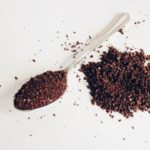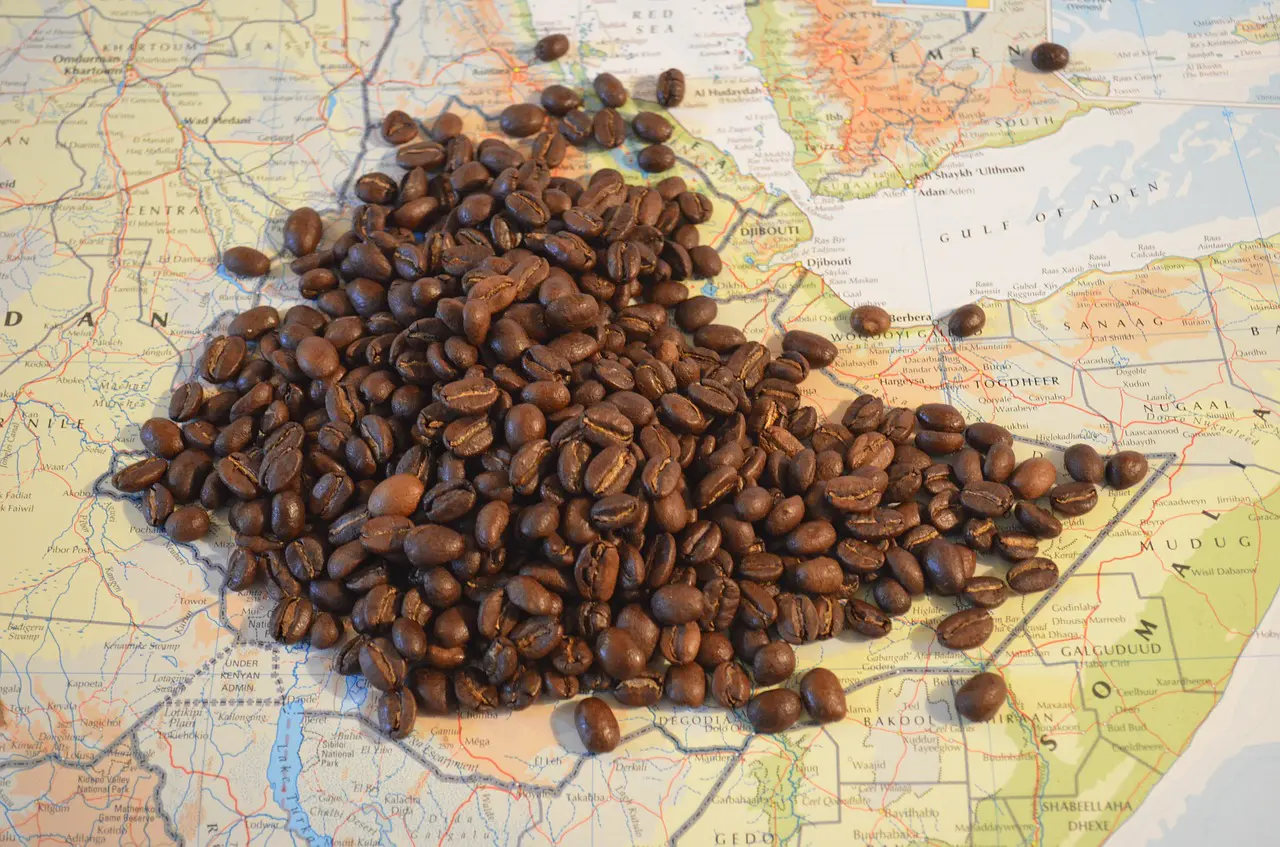Coffee comprises an assortment of chemicals naturally. This includes diterpenes, caffeine, and antioxidants. These chemicals not only add to the distinctive aroma and taste, but also to the overall characteristics of coffee.
The interesting part is that chemists have still not been able to identify a lot of these chemicals in coffee beans. You might have heard a lot about caffeine but guess what – caffeine only contributes about 15% of the bitter taste in coffee.
In this article, we will discuss the various chemicals that are there in your cup of Joe.
Organic Coffee VS Regular Coffee
Non-Organic Coffee
Coffee is a crop, and just like most crops, certain chemicals are used while harvesting the coffee. However, most of the chemicals used for coffee growing do not make their way to your cup.
Coffee is not consumed raw like vegetables and fruits, instead, coffee beans are the seeds of a fruit. The seed is drenched, inflamed, and then goes through a parching process. Later, it is roasted at or around 400 degrees Fahrenheit.
When you bring this coffee home, you soak it in boiling water, brew it at high temperatures, and then consume the water only, not the beans. So non-organic coffee is not loaded with chemicals by the time it reaches your cup.
Organic Coffee
One of the major differences between the harvesting of organic and non-organic coffee is the soil. Farmers make sure the soil where the organic coffee is grown is high in minerals.
Chemicals often kill the important nutrients in the soil; therefore if coffee is grown in a soil where pesticides are used, the crop grown will lack essential nutrients. This is something you should know if you’re out in the market looking for the best organic coffee that is chemical-free.
Chemicals Found In Coffee
Caffeine
Caffeine is one of the most highlighted chemicals in coffee and is known to be a brain stimulant. Caffeine is present in almost 60 types of plants – coffee beans, cocoa beans, tea leaves, and kola nuts are the most famous ones.
A regular-sized cup of coffee has around 75–100mg of caffeine.
Adults and Pregnant Women
The European Food Safety Authority (EFSA) determined in its study of ‘Scientific Opinion on the Safety of Caffeine’ that ‘habitual intake of caffeine up to 400mg per day do not give rise to safety concerns for non-pregnant adults.’
The study also mentioned that pregnant or breastfeeding women can safely take up to 200mg per day.
Common Effects of Caffeine
A wide-ranging study has shown that there are quite a lot of useful effects of caffeine in the diet, such as better responsiveness, attentiveness, and better physical performance. On the other hand, there can be adverse effects, such as troubled sleep patterns.
Antioxidants
Coffee, in general, comprises different types of chemicals that exhibit antioxidant properties. These comprise chromogenic acids and melanoidins, which may aid in neutralizing oxidants.
Research has revealed intensification in blood antioxidant levels after drinking coffee.
Various Caffeine Aspects and How They Affect The Body
Numerous elements like the level of roast, condiments including milk or sugar, and the percentage of coffee-to-water, make it hard to relate these escalations in blood antioxidant levels to chemicals in coffee.
Different antioxidant chemicals present in coffee seem to display different effects in the body, but there is further investigation needed on the bioactive and possible roles of these chemicals before deductions can be drawn.
Diterpenes
The diterpenes, cafestol, and kahweol, are both present in the coffee oil naturally. A higher intake of these chemicals can increase serum levels of LDL or saturated fat.
The effect is mainly linked to the process of brewing as these chemicals are mainly retained in the filter paper but pass into the infusion in Scandinavian boiled coffee, Cafètiere (plunger pot), Greek, and Turkish coffee.
Soluble Coffee and Consumption Levels
Soluble coffee does not contain these cholesterol-raising chemicals. Reasonable intake of espresso, like 2-3 cups a day, also has insignificant effects, as levels are lesser than unfiltered coffee and portion sizes are reduced.
Some researchers propose that diterpenes may also have a shielding role against some cancers, although more research is required here.
Ochratoxin A
Ochratoxin A (OTA) is a mycotoxin formed due to fungus that can grow on badly stored coffee beans. OTA is present in foods like cereals and dried vine fruits when they are stockpiled under moist environments.
In 2020, The European Food Safety Authority (EFSA) in its research on ‘Risk assessment of ochratoxin A in food’, established that ‘possible associations between OTA exposure and kidney disease, bladder or hepatocellular cancer have been investigated in epidemiological studies, but it is not possible to establish a causal link between exposure to OTA and adverse effects in humans.’
Furan
Furan is formed naturally during heating or brewing the coffee. It is found in a wide range of foods and drinks, including baby cereals, baby food in cans, breakfast mueslis, cornflakes, and coffee. Furan is believed to have been part of the human diet for hundreds of years, as it is produced through customary cooking techniques.
Many studies specify that furan levels considerably fall during coffee brewing, as this chemical is extremely volatile and disperses readily.
The Nutritional Information of Coffee
Here, we will walk you through the nutritional profile of black coffee. The nutritional profile varies as 100ml of black, caffeinated coffee is different from the coffee that has sugar (or other sweeteners) and milk.
Nutrition information Of Black Coffee
Black coffee does not contain macronutrients, carbohydrates, fat, and protein. It only contains 1-2 kcal per 100ml. However, when milk and other condiments are added, the calorie count changes. The size of the cup also affects the nutritional value.
The sodium level is considerably low. You should keep one thing in mind, that the source, growing environments, blend structure, and dispensation of the coffee also affect the overall dietary profile of coffee.
The table below provides the micronutrient dietary profile of 100 ml of medium-strength black coffee.

Coffee and Hydration
There is a common myth that black coffee causes dehydration. Black coffee contains 95% water and, research says, when you consume black coffee reasonably it intensifies your energy levels. Hence, a cup of coffee can aid in contributing to everyday fluid steadiness.
Caffeine intake of up to 5 cups per day is all right and does not lead to dehydration. Black coffee is considered to be an amazing pre-workout drink as well because it escalates your energy levels.
Coffee and Fluid Distribution in the Body
Sometimes a mild diuretic effect is experienced but that occurs for a very short time and it is not sufficient to overshadow the benefits of coffee.
Moderate caffeine intake does not modify total body water and fluid dissemination, and drinking different types of caffeinated drinks, such as coffee, can help in meeting the body’s requirement for liquids.
Our Final Word on Chemicals in Coffee
Your cup of Joe has a lot of different chemicals that you might not have been aware of. And also, there are a lot of negative things that you might have heard or read somewhere.
However, if you are drinking this amazing drink in moderation (up to 5 cups a day), there is no reason to worry about any chemicals or the effects of these substances on your body.

Hi my name is Larry, a coffee aficionado from the US. I have already visited Colombia, Sumatra, Guatemala, Costa Rica, Ethiopia and Jamaica in my pursuit of finding the best-tasting coffee beans. I currently write from Bali and enjoy the relaxed life that you can only find in Canggu. Welcome to my coffee world!





